In anime, "waifu" is a way to refer to a female character as if it were their wife, often sarcastically. That is, your waifu is the character you'd want to marry with, if they weren't a character.
From there, a series having many "waifus" means it has many characters that could be potential wives, which basically means it has many cute girls, i.e. "waifus" is synonymous with "heroines" in the dating simulation game sense.
Definition
When someone claims a character is their 2D wife by saying stuff like "she's my waifu," etc. It can mean a number of things. They could be joking, memeing, because it's a meme, or they could be actually serious about it.
Furthermore, the waifu could be the most moe girl, or the smartest, or one that has the most attractive personality, or the hottest, or the one with literally no personality at all, and so on. It depends entirely on the fan's taste so she could be anything.
Is Waifu a Japanese Word?
The word waifu as used in English is not a Japanese word. The reason why is a bit complicated.
Basically, you have three words:
- Wife, an english word.
- ワイフ, a katakanization of "wife," seldom used in Japanese
- waifu, a romanization of ワイフ, used in the English anime fandom.
The katakanization waifu ワイフ is just the English word "wife" loaned into Japanese. It means literally "wife," not "anime wife," or "2D wife," or whatever. Just "wife."
A Japanese person wouldn't know what waifu means in the English anime community. You can even find pages in Japanese trying to explain what this English slang means.[e.g. NSFW: waifu - eigoslang.com, accessed 2019-01-19]
Furthermore, people wouldn't even say waifu in Japanese to mean their "wife," since they'd rather use native Japanese words that mean "wife" instead, like tsuma 妻.
See terms for family members in Japanese for a list.
Japanese people speak Japanese, not English, and they read Japanese, not English, so while they can read the three Japanese alphabets, they don't know how to read and pronounce words written with the Latin alphabet, like "wife."
When such words are loaned into Japanese, they're converted to katakana, which Japanese people know how to read and pronounce. That's how you get ワイフ. Due to differences between languages, the pronunciation of the katakanization tends to differ from the original pronunciation.
Conversely, non-Japanese people can't read katakana, so they can't read ワイフ. To make a Japanese word such as this readable for such audience, an opposite transliteration is necessary that converts Japanese into the Latin alphabet. That's how you get wa-i-fu.
In summary, the English "waifu" is loaned from the Japanese waifu ワイフ that's loaned from the English "wife," but when English loaned it back from Japanese, it added a meaning that it didn't have in Japanese.
See eisei-wago 英製和語 for other English words made out of Japanese words.
Pronunciation
The word waifu is pronounced "why-foo."
For reference, just pronounce the first syllable (kana 仮名) of these well-known Japanese words and you'll get waifu:
Wa-i-fu, waifu ワイフ.
Kanji
The word waifu ワイフ is a word that doesn't have kanji. It's common for words loaned from English and other gairaigo 外来語 to not have kanji and be written with katakana exclusively.
Origin of Waifu
The word waifu, as it's used in western anime communities, comes from the anime Azumanga Daioh.
Azumanga Daioh
In 2002 there was an anime called Azumanga Daioh (or Azumanga Daiou あずまんが大王, meaning "Great King Azumanga."), based on an yonkoma manga of same name.
It was a Cute Girls Doing Cute Things™ series, in which one of the side-characters, Kimura-sensei, had literally said he became a teacher just because he liked high-school girls. (a.k.a., he was a pedophile. If this was GTO he would be the main character.)
In Volume 2, Chapter "January," page 10, a strip showed him in class when a photo drops from his pocket (I assume his pocket?), one of the girls picks it up, meaning to return it to him but before asking who is the woman in the photo. He answers: mai waifu マイワイフ, the katakanization of "my wife," leaving the whole class in shock. After all, everybody assumed he was only after underage girls, how'd he get married with an adult woman?!
- ja, mata raishuu
じゃ また来週ー
Then, until next week~ - sensei, nanka otoshi...
先生ー なんか落としまし・・・
Teacher, [you] dropped somet...
- otoshimashita
落としました
Dropped.
- otoshimashita
- onna no hito no shashin?
女の人の写真?
A photo of a woman? - kiree na hito!
きれーなひと!
[What] a pretty person! - dare?
誰?
Who [is she]? - mai waifu
マイワイフ
My wife. - uso'!?
うそっ!?
No way!?
This manga strip was actually published in 2000, but this "mai waifu" phrase wasn't noticed by then.
That's because if you read it in Japanese you wouldn't see anything special about the phrase, and if you read it translated then it'd be translated as "my wife," so you wouldn't see "mai waifu" written anywhere.
It was only when the 2002 anime adaptation showed up that western anime fans noticed the phrase.
After this, people started using the word waifu to refer to their 2D wives and it spread like the plague a meme.
Japanese Version of "Waifu"
Since waifu is only used in English, not Japanese, is there a Japanese equivalent for waifu? Yes, sorta. To say waifu in Japanese you would say ore no yome 俺の嫁.
Ore no Yome 俺の嫁
The phrase ore no yome 俺の嫁 would be the Japanese equivalent of "my waifu."
Unlike waifu, ore no yome can also be used toward real-life people. It can mean "my wife," or "my bride," or even "my daughter-in-law."
See the meaning of yome 嫁 for details.
- X wa ore no yome!! 〇〇は俺の嫁!!
X is my waifu!!
X is my wife!!
X is my bride!!
X is my daughter-in-law!!
Anyway, the set phrase ore no yome is a Japanese meme, or it was a meme, since it's fallen out of use in Japan. [「俺の嫁」を英語で言うと「WAIFU」なの、結構好きだよ - jpneet.com, 2019-01-19]
You can still find ore no yome used in some anime and manga that focus on otaku lingo, but it's not used by the Japanese anime community as much as it used to be in the past. And it's not used as much as waifu in English.
- Context: a bunch of otaku watch a mahou-shoujo TV anime.
- ichigo no akuma dete-kite nyorin
イチゴの悪魔でてきてにょりん
Come out strawberry demon nyorin.- nyorin - doesn't mean anything, used here because it's a cute way to end the sentence, a gobi 語尾.
- piroriroriroriin
ピロリロリロリーン
*weird magical sound effects* - Ichigo-tan no taan kita
イチゴたんのターンキターー
Ichigo-tan's turn came~~- ~tan ~たん - a cute honorific suffix used mainly toward moe anime characters.
- Ichigo-tan wa ore no yome
イチゴたんはオレのヨメーー
Ichigo-tan is my waifu~~ - katakatakatata
カタカタカタタ
*typing furiously*
FAQ
For reference, the answers to some frequently asked questions about this mysterious concept that is a waifu.
Is Waifu a Joke?
Yes, and no.
To a lot of people into anime, a waifu is just a convoluted inside-joke. A bunch of memes and references stringed together, their origins lost in time.
To a handful few, it's a serious concept.
If you fall in love with a fictional character, what can you do? You fell in it! It's over now! All you can do is love her! So some people actually end up charmed by a certain character as if they were the love of their life, as if they were their special person (character).
The degree to which they commit to this one-sided waifu love relationship varies.
At bare minimum, they'll just say who their waifu is when asked, and do nothing in particular to prove their love.
But there are people out there that spend thousands of dollars into merchandise and paraphernalia featuring their waifu. They buy all the blu-rays, they pay for fan-art, they got posters, wallpapers, dolls, action-figures, doujinshi, dakimura, etc. They literally enshrine the waifu in their bedroom, to the point it starts looking pretty creepy.
Some artists will only draw fan-art of a specific series they like. Well, some artists with waifus will draw their waifu exclusively.
This sort of behavior mirrors that of a psychopathic stalker: fixated on a certain person, always following them, writing her name on the walls like a maniac, having a copious amount of images about her around, etc. So it's no wonder it usually gets portrayed in anime as a delusional neet hikikomori otaku with disturbing mental problems.
Because the fandom kind of always makes self-depreciating jokes about themselves, the people joking about waifus end up mimicking those that actually have some sort of bizarre waifu addiction.
This means that everything that's joked about waifus is also a serious thing for someone out there, and everything people seriously into waifus do gets joked about eventually.
- Context: Fujiwara Chika 藤原千花 explains what (in her mind) is an anime otaku to Shinomiya Kaguya 四宮かぐや.
- {aniota tte iu} no wa desu ne
アニオタっていうのはですね
That [which] {[one] calls "anime otaku"} [is], [you see]...
An "anime otaku" [is], [you see]...- aniota - abbreviation of anime otaku アニメオタク.
- {{toshi-shita no kyara wo mama-atsukai shitari}
{{jibun no yome to ii-hatte} kekkon shiyou to shitari}
suru} hito-tachi no koto desu
年下のキャラをママ扱いしたり自分の嫁と言い張って結婚しようとしたりする人たちの事です
People [who] {do stuff like
{treating characters younger [than them] as their mothers},
or {{asserting [the character is] their wife} and trying to marry [the character]}}- mama-atsukai - to treat someone like a mama ママ, like a "mother." In this context, Fujiwara is referring to babumi バブみ, which refers to when a young girls feels like a mother. The babu part is a baby's blabbering, while the ~mi suffix is the same as omomi 重み, which is the feeling of weight, that something "is heavy," omoi 重い.
- kyara to kekkon!?
キャラと結婚!?
Marry with a character!?
Your Waifu is Not Real
The phrase "your waifu is not real" is a rather obvious statement used to snap people out of loving a 2D character.
After all, she's a fictional 2D character designed by a random guy somewhere. You'll never really be with her, as she has no physical body. She was probably drawn by a bunch of underpaid animators, probably male and in their 30's, and voiced by multiple random women across the globe. That's not a whole lot of identity, is it?
And to make matters worse: your waifu is probably some the waifu of other guys, too. She doesn't even really know you, does she?
But that doesn't stop people from loving their waifus. Surely, if something like this stopped them, you could say it's not real love. As real love is said to overcome any barrier. Even all these barriers.
Waifu vs. Best Girl
Regardless of how you've chosen your waifu, or how serious you're about committing to your relationship, declaring a waifu infers a degree of unique and special treatment. This is different from simply choosing a best girl in a show, a season, or a year.
For example, imagine there was a beauty contest in your city based on votes. Just because you voted for a girl, that doesn't mean you're going to marry her, but, on the other side, if your wife entered the content, you're probably going to vote for her.
Likewise, fans do vote for their waifu on best girl polls if they're participating, but just because they voted for someone that doesn't mean that girl is their waifu.
Having Multiple Waifus
The act of having multiple waifus is absolutely disgusting extremely frowned upon. After all, it's beyond discussion that a decent human being would only have one waifu. Having multiple waifus is something savages do. Peasants. Polywaifu has no place in a civilized society.
Just like in romance stories the main character falls in love with one girl, and in romantic comedies there's often a love-triangle (on in Gamers, a devil summoning love pentagram) and the plot issues from the difficult choice of choosing one love interest over the other (a choice Chihaya can't make even after 50 episodes!), and in visual novels you're supposed to pick one route and set the correct flags to make it to the good end with one girl, and in Harvest Moon you can only have a family with one girl (or guy in the girl's version), and in a harem anime the girl characters fight over to be that one girl the guy chooses, and in real life in most countries you can only marry one person at a time and polygamy is forbidden for multiple reasons, and how the idiom is about meeting your other half and definitely not about meeting your other thirds, etc. you should only have one waifu.
It's immoral to have more than one waifu. Your waifu can be bitchiest character, the one with vacuum for personality, the one that's not even of legal age, the one that's actually a guy, the one that's actually a demon, the one that's actually a cat and not a person, the one that's trash, or even the one that's all of this at once, but you only get to have one. That's where we draw the line. Your waifu has to be the most important girl in your (lack of) life, so you can't possibly have two of them.
Seasonal Waifus
Also frowned upon, albeit not as much as having multiple waifus, is the act of keeping just one waifu at a time, but switching waifus seasonally, or infrequently, one for another. This may happen for various reasons.
- The fan got tired of his current waifu and wants a new one.
- The fan watched a new show airing this season and there's a girl he thinks would make a better waifu than his current waifu.
- The fan watched a continuation or spin-off airing this season featuring his waifu where she does something that made him want divorce.
Regardless of reason, it's obvious this so-called "fan" doesn't love his waifu enough. As legends romanticize: love is eternal and unconditional. You can't just treat your waifu like an old sock that you just replace for a new one when you feel like. If you don't think you can stay together until death do you apart, don't make her your waifu.
Can I Have a Waifu if I Already Have a Wife?
A waifu is your 2D wife, so to some people it makes sense you can have a 3D wife too. (TL note: 3D girl means a real girlfriend.)
To others, however, you can only have one true love in your life, so it doesn't make sense for your to have a wife if you already have a waifu, and having one is tantamount to cheating.
- Context: a wife doesn't understand what her husband is saying.
- Minchi wa ore no yome!!
ミンチは俺の嫁!!
Michi is my waifu!! - omae no yome wa atashi daro!!
お前の嫁はあたしだろ!!
Your wife is me, [did you forget]!! - Footnotes:
- ore no yome: nijigen kyara e no aijou hyougen no hitotsu de, {{{oyome-san ni shitai} hodo sono kyara wo aishiteiru} toiu} imi, mata wa sengen.
俺の嫁【おれのよめ】 2次元キャラへの愛情表現のひとつで、お嫁さんにしたいほどそのキャラを愛しているという意味、または宣言。
My waifu: one expression of affection toward 2D characters, the meaning {being [that] {[you] love that character enough {to want to make [them] [your] wife}}}, also a way to declare that.- Inside 【】is the furigana for 俺の嫁.
Your Waifu is Trash
Everybody knows my opinion is the only one that matters, everybody else is wrong. My taste in anime is objectively good, and other people have shit taste. So it's only logical to conclude that my waifu is the best, and your waifu is trash.
However, for some reason I can't honestly grasp, these other people, on the internet, keep telling me that my waifu is trash. They're wrong, obviously. The trash is theirs. But the irony doesn't stop them from spouting such unhinged nonsense. No matter how many times I say: your waifu is trash, they won't listen, won't believe it, and they just keep fighting back.
Male Waifu
The profound world of waifuism isn't limited to the male sex. If you're female, and have a male character you like, he, too, can be your waifu, except you'd used a different word in English for "male waifu."
Husbando
A "husbando" is a male waifu. So if waifu is wife, husbando is husband.
Note that husbando doesn't even come from the romaji of the Japanese katakanization of "husband" like "waifu." If that was the case, then "husbando "would be hazubando ハズバンド instead. The word probably just came from someone trying to make "husband" look more like a katakanization.
Husbando in Japanese
Term ore no yome 俺の嫁 may also be used by women (and men?) to refer to their husbandos. This is despite the pronoun ore 俺 being mostly used by men and despite yome 嫁 meaning a "(female) bride" and not a "(male) groom."
A slightly more fitting ore no muko 俺の婿, "my groom" also means "husbando" in Japanese. The term watashi no muko 私の婿 also exists, also meaning "my groom," but using the more neutral pronoun watashi 私.
According to Pixiv, however, ore no muko is more common than watashi no muko, despite ore being considered a male pronoun, so you'd think it's a guy talking about his groom, and not a girl talking about her groom. This is probably because ore no muko at least sounds like ore no yome, while watashi no yome may be just too far from the original term.
Is a Trap a Waifu or a Husbando?
I... I don't know? Try asking them?
To try to answer this seriously, a "trap" like Astolfo is but a character in a work of fiction, and any work of fiction changes in meaning according to the interpretation of the audience.
If someone views Astolfo as their waifu, they are, and if they view Astolfo as their husbando, they are.
Since the interpretation of a work of fiction varies from person to person, so may the gender of a fictional character.
Daughteru
Another fake Japanese word made-up by English-speaking fans is "daughteru."
Calm down! This is not what you're thinking! This doesn't mean a daughter you have with your waifu. It also doesn't mean you're marrying your daughter. It just means a 2D girl you love as if it were your daughter rather than your wife.
If you don't understand what this means, go watch Hinamatsuri ヒナまつり.
The proper katakanization of the word "daughter" would be dootaa ドーター.
Daughteru in Japanese
The word for "daughteru" in Japanese would be ore no musume 俺の娘, literally "my daughter."
Sonfu
A sonfu is a male daughteru, a character you love as if it were your son. This is also obviously fake Japanese, someone just affixed the fu of waifu to the word son, the proper katakanization of "son" would be just san サン.
Soneru
A soneru is another term for a male daugheru. The only difference between soneru and sonfu is that one comes from son plus eru of daughteru while the other from son plus fu of waifu. I think sonfu is used more frequently, so if I had one I'd probably go with that, even though it sounds weird.
Sonfu in Japanese
Going by logic and rational thought, following the evidences presented in this post, connecting the dots and extrapolating the pattern, the word "sonfu" in Japanese would be ore no musuko 俺の息子, literally "my son," HOWEVER, consider two things before uttering it:
- Sonfu is an extremely rare word in English. If you go by hits on Google hits, waifu has 10 million results, husbando 1 million, daughteru 100 thousand, and sonfu just 5 thousand. Basically, female characters are more popular and nobody wants 2D children, so a male 2D child has almost no demand, therefore the word gets no usage. The same applies in Japanese. The chance of someone understand what you mean by "sonfu" is about the same of someone getting ore no musuko means a 2D son. It'd only get understood in certain circles and even then just maybe.
- Also, ore no musuko means "my penis" in Japanese. It's an euphemism. So I'd avoid saying that out of nowhere if I were you.
More Waifu Stuff
For further reference:
- /r/waifuism/
A subreddit dedicated to people who have a waifu. Claims to be serious. May or may not be. - waifu2x
Not satisfied with the size of your waifu? Enlarge your waifu with these few simple steps! A software created specifically to resize anime images to higher resolutions while maintaining a semblance of quality. You know, CSI-style. - Waifu Labs
Someone taught an artificial intelligence how to draw cute anime girls. You can create your own randomly generated waifu in this website. Illustrators are on suicide watch as computers have started to steal their jobs! - MyWaifuList
A website dedicated to deciding whose waifu is the trashiest waifu through user votes. It also lets users votes on the best waifu, like a popularity contest, like the International SaiMoe. And there's even a way to declare your one true waifu. - RIP Grape-Kun
Grape-kun was an inspiration to all. Truly a follower of the no waifu no laifu dogma.
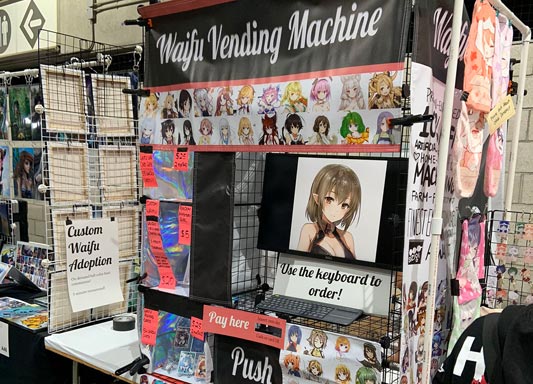

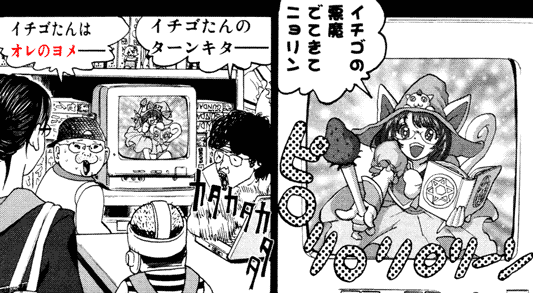
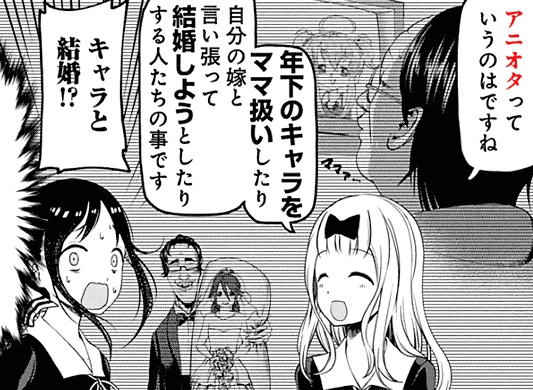
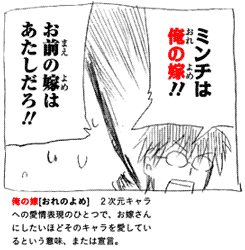
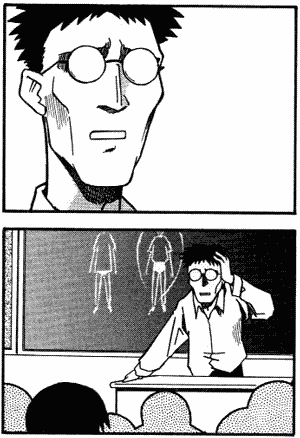
No comments: